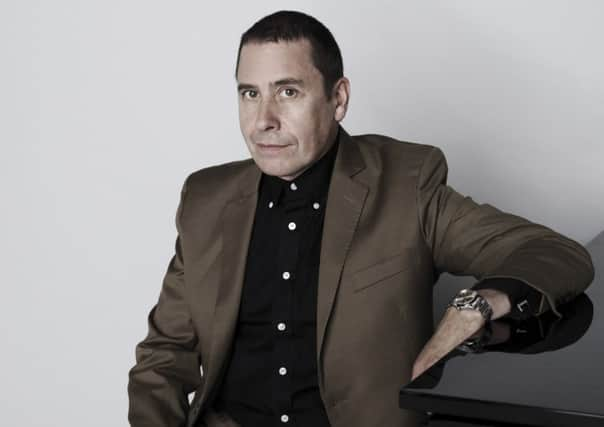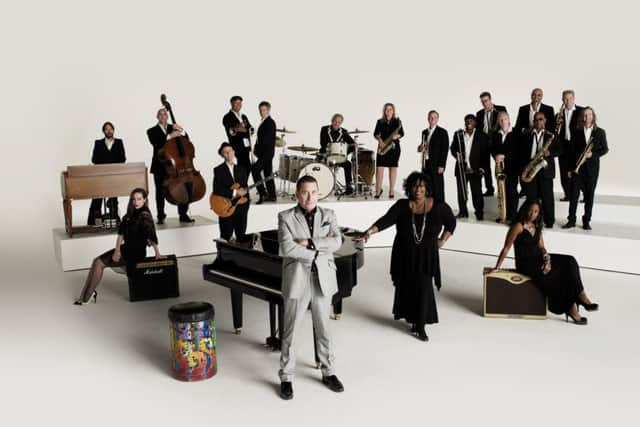All for the love of jazz and the blues


AS an advocate for the sheer joy of playing music to a live audience, there are surely few who can match Jools Holland. Conversation with the host of BBC 2’s long-running music show Later zips along when matters turn to touring with his own big band, the Jools Holland Rhythm and Blues Orchestra.
“It’s an incredible gift, music,” he says. “There are so many people that love playing; to play professionally if you do it and love the music you play, you want to do it as much as possible. Lots of people do it and don’t get paid. I would too. It becomes both a habit and a joy.”
Advertisement
Hide AdAdvertisement
Hide AdNext month the 56-year-old pianist brings the Rhythm and Blues Orchestra to Nostell Priory, near Wakefield, following in the footsteps of Elton John and Van Morrison, who’ve also played outdoor concerts in the picturesque grounds of the Palladian house. Holland loves the great outdoors as a concert setting.


“I think they can be amongst the most magical places for people to play. There’s something about playing in a forest that adds a touch of magic to it. A concert is an exchange between an artist making a performance and the people they’re performing to. If the place is special it adds a great deal to what you are doing.”
Once a feature of the age of jazz and swing from the 1920s to the 1940s, big bands are a rarity these days. Certainly few are touring the world as regularly as Holland’s, nearly two decades since their formation. The only big bands he’d seen were on film, he says, so the coming together of the orchestra was a gradual process.
“What’s happened is it evolved into a big band. It’s very difficult for anybody including me to start a big band. For one, finding the people would be difficult. The important thing I realised watching Count Basie, Lionel Hampton and Duke Ellington, was the fact that it was mostly the same people in the band for a long time. They’re not just reading music, they’re thinking the same things. They did not have to use too many words to explain what was going on.
Advertisement
Hide AdAdvertisement
Hide Ad“The other thing I learned from looking at them,” he adds, “was they always had an element of the blues about them. These bands were led by a pianist, which I identified with, and they had to do lots of shows to make themselves strong. It’s like being a sportsman, you have to stay in trim.”
The rock on which the Rhythm and Blues Orchestra is founded is Gilson Lavis, Holland’s longtime friend from their days together in the new wave band Squeeze.
“He’s a special drummer and an extraordinary person as well. Without question that sets the pulse and the tempo of what we are doing. Also he’s a very spiritual, kindly person, from that not only does the pulse of the rhythm come, it’s a very good thing for the pulse of the orchestra.”
A regular feature of the orchestra’s tours has been their guest vocalists. At Nostell Priory they will have two.
Advertisement
Hide AdAdvertisement
Hide AdMarc Almond is “an amazing torch singer who has great songs,” says Holland. “With the orchestra, put the two things together and it really adds up to four instead of two.”
Former Spice Girl Melanie C, he adds, “has a unique and amazing voice. She has a great take on popular music. We do a Stevie Wonder song, I Wish, and we make it our own. That’s the point about both of them as artists – they’re very comfortable with what we are doing.”
The orchestra also has its own resident singers – Holland’s daughter Mabel Ray, Louise Marshall and Ruby Turner, whom the band leader describes as “remarkable” and the “boogie-woogie queen”.
“The greatest invention that America came up with was jazz and blues. Hong Kong came up with the skyscraper, the Germans invented the hot dog, but the unique American invention was jazz and blues music. In the early part of blues and jazz is gospel – church singers come from a similar place in tones and sound. Ruby Turner is one of the few people that has that spirit. Without thinking she plays instinctively with us.”
Advertisement
Hide AdAdvertisement
Hide AdLater, the TV series that Holland has presented since 1992, is now in its 44th series. The key to its longevity, he believes is: “It realises that essentially the show is the servant of the song and the artists. It’s not about anything else other than music or the artists. We have folk, blues and jazz on which would not have a place anywhere else, it’s great. You can have legends as well. It means that we can capture both people on their way up and towards the end of their careers as they get older. I’m delighted and proud of what we have done.”
Holland’s own musical roots stem from his working class family in Deptford.
“My mother and father were very supportive, they wanted me to be a musician. I think they always encouraged an interest in the arts. I remember my father telling me when they were at school he was into Mozart. The only place you could hear it was by borrowing a record from the library. He would cycle to the library get a record of the first movement, listen to it, then cycle back and get the second movement. That’s real commitment, that’s really being a fan.”
He remembers the house being full of blues, jazz and opera records when he was a boy. He was eight when his uncle David, a lorry driver, taught him to play boogie-woogie piano. “It was fantastic. I picked it up by ear,” he says. “All the chaos of the universe became ordered for me. I’ve been trying to figure it out ever since. The excitement of playing that on the piano has never left me.”
Jools Holland’s Rhythm and Blues Orchestra play at the Flashback Festival on Sunday, June 15. Tickets £37.95 adult, £22 child, tel: 0845 075 6101.